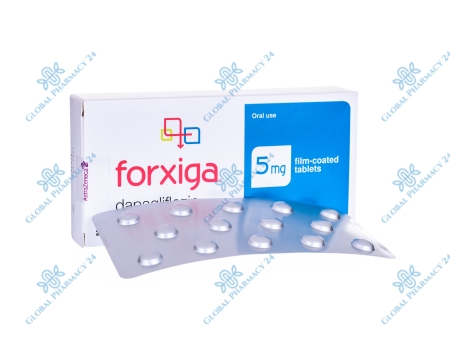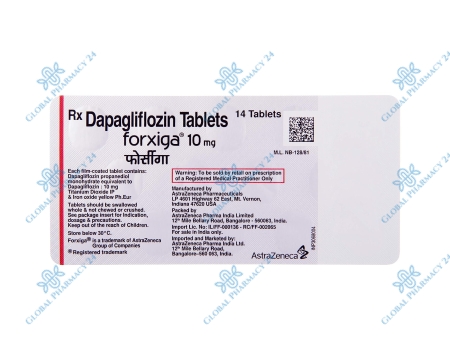| Characteristic | Detail |
|---|---|
| Active Ingredient | Dapagliflozin |
| Dosage Forms | Tablets (5 mg, 10 mg) |
| Indications | Type 2 Diabetes, Heart Failure, Chronic Kidney Disease |
| Mode of Action | SGLT2 inhibitor, reduces blood sugar levels |
| Duration of Effect | 24 hours |
Understanding Forxiga: A Deeper Dive
Forxiga, known by its generic name dapagliflozin, is a revolutionary medication in the management of type 2 diabetes, heart failure, and chronic kidney disease. It belongs to a class of drugs known as sodium-glucose cotransporter 2 (SGLT2) inhibitors. By blocking the reabsorption of glucose in the kidneys, Forxiga allows for the excretion of excess glucose through urine, effectively lowering blood sugar levels in patients with diabetes.
Its unique mechanism of action not only aids in glycemic control but also offers cardiovascular and renal benefits, which distinguishes it from other diabetes medications. The flexibility in dosing options, with 5 mg and 10 mg tablets, allows healthcare providers to tailor treatments to individual patient needs, optimizing therapeutic outcomes.
What is Forxiga and How does it Work?
Forxiga operates by inhibiting the SGLT2 protein in the kidneys, reducing glucose reabsorption and promoting its excretion via urine. This process results in lowered blood glucose levels, making it an effective treatment for managing type 2 diabetes. Beyond glucose control, Forxiga also has beneficial effects on heart and kidney health, marking a significant advancement in diabetes treatment.
Dosage Guidelines for Forxiga
The recommended starting dose for Forxiga is 5 mg once daily, taken in the morning, with or without food. For patients requiring additional glycemic control, the dosage can be increased to 10 mg once daily. It's important for patients to follow their healthcare provider's instructions closely to maximize the medication's benefits and minimize potential risks.
Side Effects and Safety Considerations
While Forxiga is generally well-tolerated, it can cause side effects such as urinary tract infections, dehydration, and genital fungal infections. Rarely, more serious conditions like diabetic ketoacidosis and lower limb amputation risks have been reported. Patients should monitor for signs of adverse effects and consult their healthcare provider immediately if they occur.
Benefits of Forxiga: Advantages and Disadvantages
Forxiga's role in diabetes management extends beyond mere blood sugar regulation. Its cardiovascular and renal protective properties have been a breakthrough, making it a preferred option for patients with multiple health concerns. However, as with any medication, weighing the benefits against the potential risks is crucial for patient safety and treatment efficacy.
The comprehensive approach of Forxiga to treating diabetes, by not only controlling blood sugar but also offering protection against heart and kidney diseases, sets a new standard in the treatment paradigm. Nevertheless, patient education on possible side effects and adherence to prescribed regimens is essential for achieving the best outcomes.
Advantages of Using Forxiga
- Effectively lowers blood glucose levels.
- Provides cardiovascular and renal benefits.
- Has a convenient once-daily dosing.
- May aid in weight loss and blood pressure reduction.
Disadvantages and Potential Drawbacks
- Potential risk of urinary tract and genital infections.
- May cause dehydration and hypotension.
- Rare risks of diabetic ketoacidosis and amputation.
- Requires monitoring of kidney function before and during treatment.
Forxiga in Comparison: A Look at Other Diabetes Medications
When comparing Forxiga to other diabetes medications, it's clear that its unique benefits, particularly in terms of cardiovascular and renal health, offer a significant advantage for certain patient populations. The choice of diabetes medication must be individualized, considering the patient's overall health, treatment goals, and potential side effects.
The integration of Forxiga into diabetes treatment plans reflects a broader shift towards medications that offer multifaceted benefits. However, the decision to use Forxiga or another medication should be based on a comprehensive assessment by a healthcare professional.
How Forxiga Compares to Other Type 2 Diabetes Medications
Compared to other type 2 diabetes medications, Forxiga offers the unique advantage of promoting weight loss and providing cardiovascular and renal benefits. While other medications primarily focus on lowering blood sugar, Forxiga addresses the broader health concerns that often accompany diabetes.
Patient Experiences with Forxiga
Many Forxiga users report significant improvements in their blood sugar levels, along with weight loss and better cardiovascular health. These benefits have led to enhanced quality of life and reduced risks of diabetes-related complications. Hearing these personal stories can be incredibly motivating for individuals considering or currently managing their diabetes with Forxiga.
Summary Table of Patient Testimonials
| User | Experience | Benefits | Challenges |
|---|---|---|---|
| User 1 | Improved blood sugar control and weight loss | Lowered HbA1c, reduced weight | Minor dehydration |
| User 2 | Enhanced energy levels and cardiovascular health | Increased physical activity, better heart health | Needed time to adjust to medication |
| User 3 | Stable blood sugar levels, reduced kidney stress | Consistent glycemic control, improved kidney function tests | Concerns about potential long-term effects |
In conclusion, Forxiga represents a significant advancement in the treatment of type 2 diabetes, offering benefits that extend beyond glucose control to impact overall health positively. Its role in diabetes management is continually evolving, with patient experiences and clinical studies further shaping our understanding of its effectiveness. As with any medication, the decision to use Forxiga should be made in close consultation with healthcare providers, taking into account the individual's health profile and treatment goals.
FAQs Forxiga
What is Forxiga?
Forxiga is a medication used to treat type 2 diabetes by helping to control blood sugar levels. It belongs to a class of drugs called SGLT2 inhibitors.
How does Forxiga work?
Forxiga works by blocking the reabsorption of glucose by the kidneys, leading to increased glucose excretion in the urine and lowering blood sugar levels.
What are the common side effects of Forxiga?
Common side effects of Forxiga may include urinary tract infections, genital yeast infections, increased urination, and thirst. It's important to discuss any side effects with your healthcare provider.
Who should not take Forxiga?
Forxiga is not recommended for people with type 1 diabetes or diabetic ketoacidosis. Additionally, individuals with severe kidney impairment, on dialysis, or with a history of hypersensitivity to Forxiga should avoid taking it.
Can Forxiga be used during pregnancy?
Forxiga is not recommended for use during pregnancy. It's important to consult with a healthcare provider if you are pregnant, planning to become pregnant, or breastfeeding before taking Forxiga.
How should Forxiga be taken?
Forxiga is typically taken once daily, with or without food. It's important to follow the dosage instructions provided by your healthcare provider and to regularly monitor blood sugar levels while taking Forxiga.
Is Forxiga suitable for children?
Forxiga is not recommended for use in children under the age of 18. Safety and effectiveness in pediatric patients have not been established.























